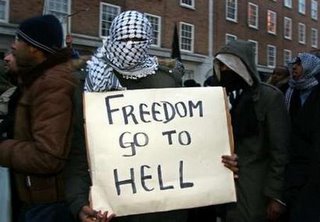
The cartoon imbroglio that is currently afflicting Europe had its origins in a test. Sight and Sign reports:
On September 30, 2005, the Danish newspaper Jyllands-Posten published twelve caricatures of the Prophet Mohammed. These had been commissioned by the culture editor Flemming Rose, after he learned that the children's book author Kare Bluitgen had been unable to find an illustrator for his new book project: the life of the prophet Mohammed, as told for children. "He wanted to see how deep the self-censorship in Denmark lies," today's Zeit quotes Rose as saying in a detailed background article.Read it here.
This provoked a series of local protests by Danish Muslims, but the controversy broadened when local organizations sent emissaries throughout the Arab world, displaying the cartoons as well as other insulting materials of unknown provenance, and asking for help. They also appealed to the UN High Commissioner for Human Rights. This got the Danish government involved in defending the freedom of the press.
At this point EU politics kicked in. Nationalist organs supposedly publicized the cartoons in the hopes of provoking Muslim radicals into undertaking unacceptable actions that would strengthen anti-immigrant imperatives in Scandinavian society. At the same time left wing organizations used the situation to launch attacks on Denmark's restrictive immigration policies. Meanwhile Islamists throughout the Muslim world were busily organizing and preparing for a round of global protests. Events were spinning out of control and nothing, it seemed, could be done to reverse the rising level of tensions.
The whole thing came to a boil in the past couple of weeks. Throughout the Islamic world and in European cities Muslims took to the streets in well organized demonstrations that in some cases involved grossly unacceptable threats of violence against the offending papers, artists, and western society in general.
Thus we find outselves confronted with another test. As many commentators have noted, irreconcilable sets of values have come into open conflict. Islamic sensibilities regarding blasphemy and acceptable speech have run smack up against Western liberal values. Can multiculturalism and the liberal tradition of free discourse survive the Islamist challenge? This is the great issue for Europe and, indeed, for all of the West.
Islamists, national chauvinists, left-wing agitators, and an irresponsible press have all contributed heavily to creating the current crisis. And none offers a suitable solution to it. The test is still in progress and its outcome will go a far way toward defining the kind of world in which we will live out the rest of our lives.
UPDATE:
Islamic protesters have burned the Danish embassy in Damascus. This is getting serious.
Gateway Pundit is all over this. [here]
I have a feeling that this crisis is going to go a long way toward delegitimizing the whole multi-culti/relativistic/victimology mindset that has for a generation and more dominated elite opinion in the West. Such silliness is tolerable, perhaps even laudable, when you are securely cocooned within the protective sheath of prosperity and military might, but confronted with the potent and implacable hatred emanating from the Islamic world, those comfortable pieties are completely dysfunctional. The public for the most part gets it. Even some Democrats are beginning to see the light. Perhaps the western media will eventually catch on to the fact that the world has really changed.
UPDATE:
For more on this subject see Protein Wisdom here.
Somehow, it seems to escape those raised on westernized Orientalism that by calling the intolerance of intolerance “intolerant,” they have reduced the concept of tolerance itself to a cruel semantic joke—the idea being that groups formed around cultural similarities, once they have honed their group message and excommunicated the dissenters—own the narrative. Outside criticism is therefore inauthentic—always tainted by the gaze of the Other, and so only to be considered secondarily (if at all) as a valid critique.
From there, it is a short journey to asserting the absolutism of a cultural paradigm—and this happens necessarily where universality (or, for postmodernists, social contracts that rely on the trappings of what is metaphysically untenable) is surrendered to competition between identity groups over primacy of “rights” in the global sense.
This battle over the Danish cartoons highlights all of these philosophical dilemmas....
No comments:
Post a Comment